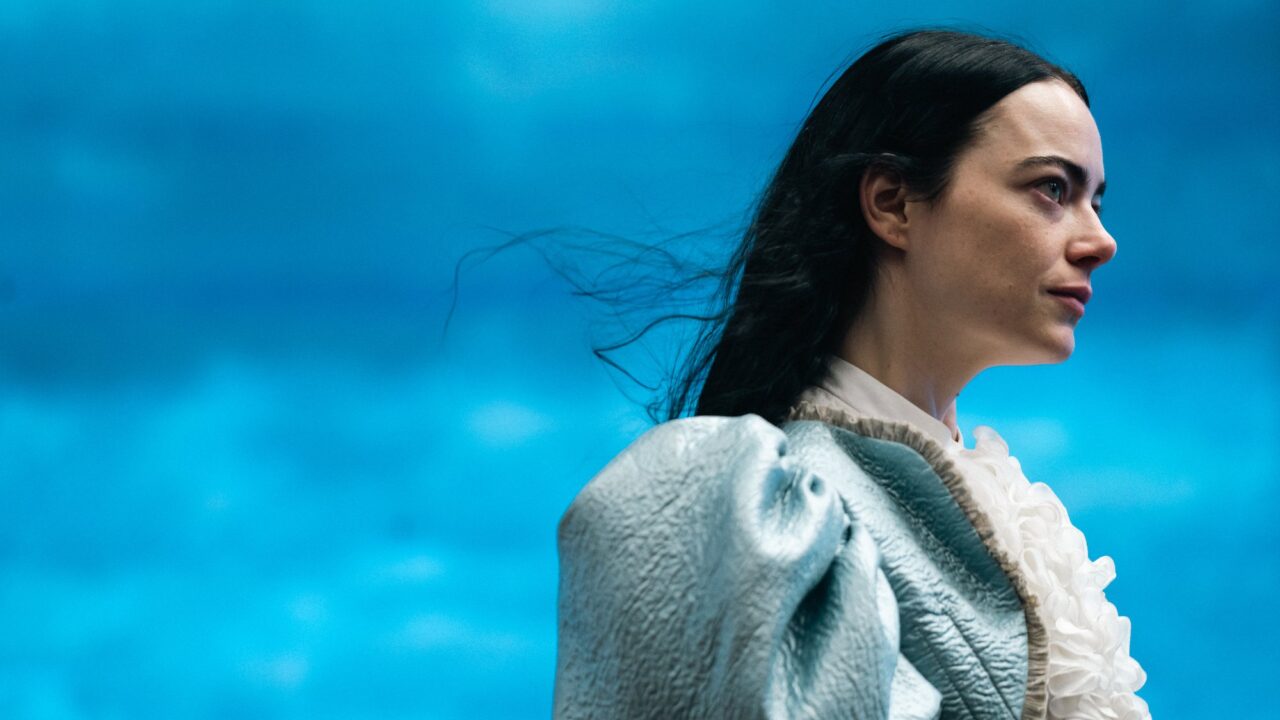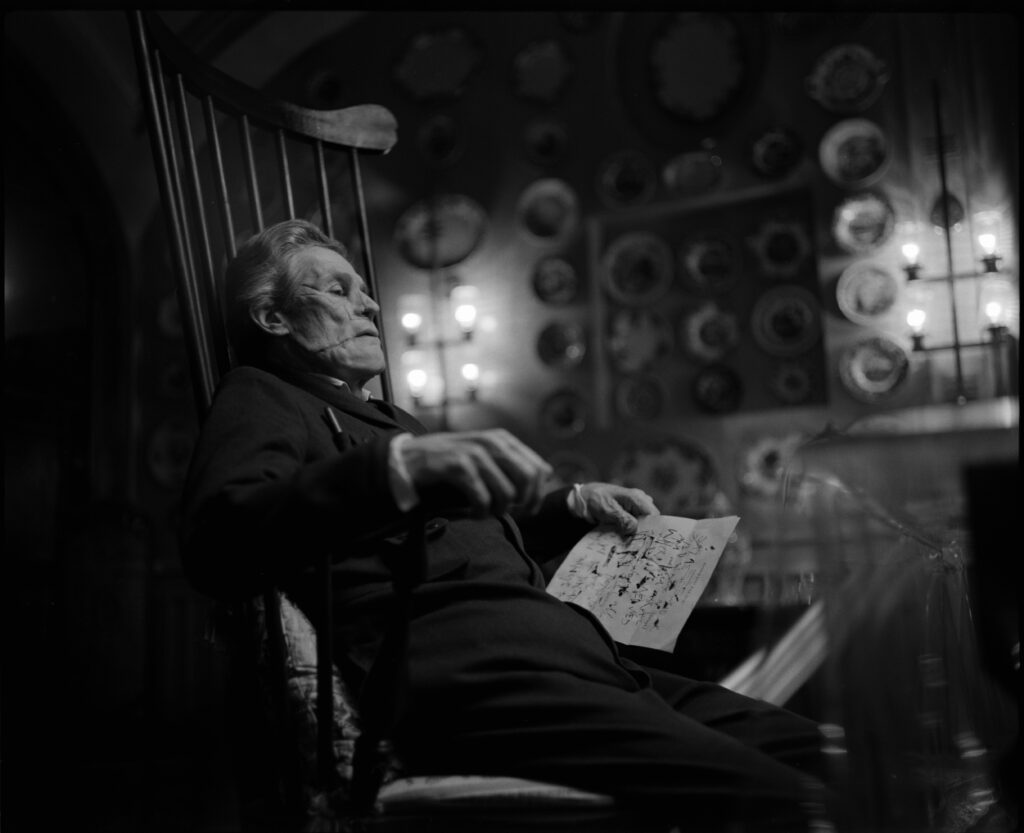Nobody’s Pretty Little Monster
In “Poor Things,” rebellion against a patriarchal house of horrors leads to a feminist flowering. Emma Stone in POOR THINGS. Photo by Atsushi Nishijima. Courtesy of Searchlight Pictures.
Emma Stone in POOR THINGS. Photo by Atsushi Nishijima. Courtesy of Searchlight Pictures.
Greek auteur Yorgos Lanthimos is a visual anthropologist fascinated with the physiology of the human brain. His past ethnographic experiments include films about children growing up in a world contrived by strict parents, lonely companions turning into animals if they fail to fall in love within 45 days, a man looming the cycle of violence onto himself and his family after killing his enemy’s father, and relatives colliding against each other to receive their monarch’s affection. His characters are human guinea pigs testing their morality and beliefs, often through sex, in the face of life-altering ultimatums. How they respond determines whether they are virtuous or evil, naughty or nice.
Lanthimos’s awe of the carnal psyche culminates in “Poor Things,” his adaptation of Alastair Gray’s 1992 novel of the same name. Set in Victorian London, the film centers on Bella (a worthwhile Emma Stone) re-entering the universe through an invention by mad scientist Dr. Godwin Baxter, played by a fortifying Willem Dafoe, whose facial scars evoke the sin pins of the “Hellraiser” Pinhead. Baxter finds Bella succumbing to her suicide attempt at the bottom of a bridge and revives her, a la Frankenstein, with a child’s encephalon. He becomes her guardian, and the black-and-white first act primarily occurs in Godwin’s mansion, full of primitive sculptures and animal mergings, such as a duck’s face stitched to a cow’s lower body. (Diabolical mammal cruelty has long been a signature of Lanthimos’ absurdism.) In this macabre environment, Bella corrals an appetite for sex after inserting an apple into her vagina, and with the assistance of attorney Duncan Wedderburn (Mark Ruffalo with yet another ill-advised accent following his disastrous French dialect in “All the Light We Cannot See”), absconds from Baxter and her fiancé Max McCandless (a funny Ramy Youssef) to experience a sexual and feminist awakening.

Disability is an overlooked element of Lanthimos’s body of work, but is hard not to notice in “Poor Things.” When McCandless enters Godwin’s home after taking his class, he loudly describes Bella as a “very pretty retard.” Indeed, her underdeveloped brain makes her act like a toddler and respond with nonchalance to insults and sexist remarks. She eats without utensils. She stomps, claps with her arms outstretched, and urinates in front of guests. Although she adds new motor skills, extends her vocabulary and ceases to speak in the third-person during her colorful adventures (in Lisbon, in Paris on a cruise ship), the film never explains how the child’s cerebrum catches up with Bella’s adult body. Does the kid’s brain run on dog years? Did Bella undergo offscreen procedures to “act normal?” Whatever the case, she doesn’t cure her neurodivergence; it just seems to disappear.
Bella has an offscreen encounter with a man with a hook on his amputated arm, for which Wedderburn berates her. The humor of Bella’s odyssey—aided by Jersken Fendrix’s elusive, mesmerizing organ score—involves a series of contests over what society deems courteous and proper. At a dinner with a couple, Wedderburn instructs Bella to say “How marvelous” and “Delighted,” and asks about the food after she embarrasses him by disclosing his penis size. With her limited outings beyond Godwin’s home, Bella can’t withhold confidential information and integrates the private into the public. In doing so, she detaboos eroticism. She makes people quander what makes something raunchy; she challenges patriarchal and neurotypical societies simultaneously.
While “Poor Things” is not as transgressive as some of Lanthimos’ earlier work, or even as its own synopsis might suggest, it is nonetheless a compelling, cackling observational study of gender, disability and class.
Though Bella recognizes the chauvinist runnings of the world after much “furious jumping” (her euphemism for intercourse) and sees that “money is a form of sickness,” she does not enact a commitment to dismantle the systems that propagate them. Lanthimos’s direction and McNamara’s screenplay stiffen the narrative when Bella attempts to be more cynical following lessons received from aristocrat Harry (the note-hitting Jerrod Carmichael). There are no disruptive calls for the kind of actions that would result in a less materialist, more feminist world. Instead, Bella continues her travels, reading books and screwing across James Price and Shona Heath’s sepia, blue, and erin-coated production designs that, while dazzling, are misaligned with her political mission. Ultimately, the provocative premise that initiated the movie gets lost.
Lanthimos is not new to the theme of disability. It is presented as a corollary of punishment and victimhood in “The Lobster” (2015), “The Favourite” (2018), and “The Killing of a Sacred Deer” (2017). But it is “Dogtooth” (2009) that most anticipates the subtle, neurodivergent dimensions of “Poor Things” with the story of sheltering parents of children with undiagnosed intellectual disabilities. In each film, the director’s depictions of disability acknowledge that ableism is embedded in social hierarchies and that the disabled are not monsters, but screens for projecting the apprehensions and phobias of neurotypical and physically abled people.
While “Poor Things” is not as transgressive as some of Lanthimos’ earlier work, or even as its own synopsis might suggest, it is nonetheless a compelling, cackling observational study of gender, disability and class. By the end, it put me in mind of a 2003 article by the queer disabled scholar S. Naomi Finkelstein. In it, they write, “When I said, fuck it, I am not going to doctors for a year, and instead went and learned to sail and became adept at kiting and began singing in choirs, it was a cripbutch act of autonomy and self-determination, which saved my life.”
A similar spirit echoes across Bella’s unapologetic journey. She feels no compunction to consult men about her excursions, yet remains grateful to the people in her life even as she shocks them with her new feminist-socialist values. In this mix of fealty and freedom, she finds solace and discovers independence.
Your support matters…Independent journalism is under threat and overshadowed by heavily funded mainstream media.
You can help level the playing field. Become a member.
Your tax-deductible contribution keeps us digging beneath the headlines to give you thought-provoking, investigative reporting and analysis that unearths what's really happening- without compromise.
Give today to support our courageous, independent journalists.

You need to be a supporter to comment.
There are currently no responses to this article.
Be the first to respond.